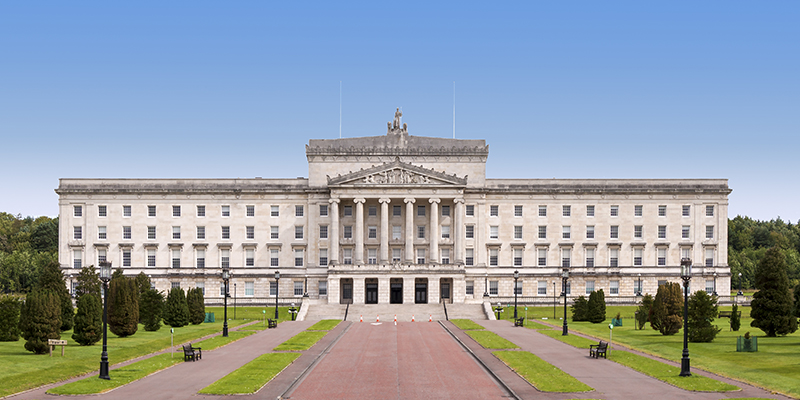
NI politicians debate ‘conversion therapy’ law
by James Kennedy
Yesterday, the Northern Ireland Assembly debated a motion on ‘conversion practices’. It called on the Communities Minister to bring forward new legislation to tackle practices activists also call ‘conversion therapy’.
The motion was passed, with 41 Members voting in favour, and 25 voting against. An amendment proposed by the DUP sought to ensure that religious freedom is protected, but despite support from UUP leader Doug Beattie, was also voted down.
To be clear, a motion does not commit the Government to action. It is merely a way for politicians to express their opinions about a particular issue.
The DUP opposed a previous motion calling for a ‘conversion therapy’ law back in 2021. It said then, as now, that some of those demanding a new law had Christian practices in their sights.
But there has been an unexpected development since the 2021 debate. The Northern Irish political system requires the parties to share out the running of departments, and a DUP Minister now runs the Communities Department. As it is responsible for legislation on ‘conversion therapy’, the DUP has to choose how to move forward.
The Minister, Gordon Lyons, explained that no one wants to see LGBT people abused or coerced. But that work was needed to assess whether gaps exist in the current law, and to see what legislation could reasonably be brought to solve any problems.
Mr Lyons also pointed out that the UK, Scottish and Irish Governments have each "experienced difficulty in arriving at a precise definition of conversion practices and of what a potential ban would include".
The Minister’s emphasis on carrying out further work instead of dangerously ploughing ahead with unnecessary criminal laws is welcome.
He added: "The matter of freedom of rights is a significant one that also has to be carefully considered, and it is a matter that we have to approach cautiously as we progress policy on this issue.”
The leader of the Ulster Unionist Party may have surprised some. It was his own motion calling for a ‘ban’ in 2021 that was referred to by others in the debate as a defining moment. In this week’s debate he explained that prayer and pastoral care must be protected.
Doug Beattie now recognises that "people's concerns about religious freedom. The right to pray and preach and to give counsel and pastoral care to someone who seeks support should not be diminished.” Those concerns were not enough to bring any UUP MLAs to vote against the motion – but neither did any vote for the motion.
Many of those demanding a ban – primarily in the Alliance Party, SDLP and Sinn Féin – did agree that religious freedom should be protected. They evidently didn’t see the contradiction in their position, supporting a motion that speaks in undefined terms and which refers to a study in which ordinary religious practices are described as abuse.
The problem is perhaps best summarised by an intervention made by Gerry Carroll. He told the Communities Minister that everyone: “respects the right of people to practise religion and to pray privately but that there is a difference between that and people using the pulpit to attack people based on their sexuality or their gender or whether they are trans or because of the community that they come from”.
Clearly, Christians do not see the teaching of biblical sexual ethics as “using the pulpit to attack people”, but there are many who accuse us of it. The Communities Minister responded: “We have freedom of speech and we have freedom of religion, and having those things means that we have the right to say things that others may disagree with. I hear things from others that I disagree with and which I may find objectionable, but that is what living in a free society is all about.”
Speeches in the debate were very short. Only three minutes was given to each party to make its case. This resulted in some glaring omissions.
For instance, not one mention was made of the fact that the motion stood in direct contradiction to the findings of the Cass Review. The motion called for a broad new law on ‘conversion practices’. But the Cass Review said a new law of that sort could scare medical professionals out of working with vulnerable children. The issue of transgenderism barely got a look in, despite being of great concern to the majority in society.
The outright failure of legislation elsewhere in the world was also missing from the debate. Thankfully, on this occasion, none of the MLAs said they wanted to model legislation on that found elsewhere. But the activists calling for a ban have consistently said they’d like a law like that found in Victoria, Australia. There, new rules for how to pray have been published, alongside official guidance that says “not affirming someone’s gender identity” can be a ‘conversion practice’.
The Communities Minister has committed to “further research and engagement”. It is vital that all aspects are properly considered. Christians must ensure their concerns are heard. In the end, the Minister may conclude that there is simply no way of legislating for ‘conversion practices’ that does not trample on fundamental freedoms.
Sign up to the Let Us Pray campaign for updates - join the campaign.
See also: ‘Conversion practices’ study authors cannot answer BBC interviewer on prayer
The Traitors and the campaign to ban ‘conversion therapy’
2026-01-16 07:47:52Plans to outlaw conversion therapy – what to expect in 2026?
2025-12-23 09:47:27
